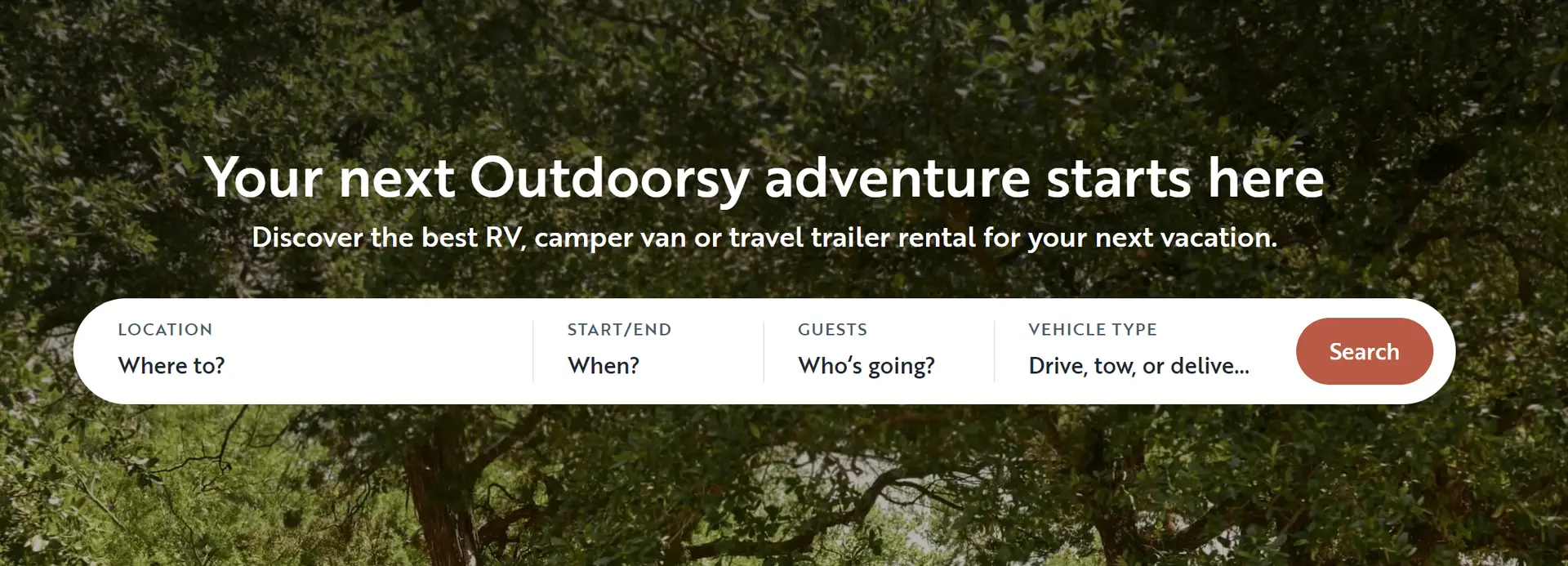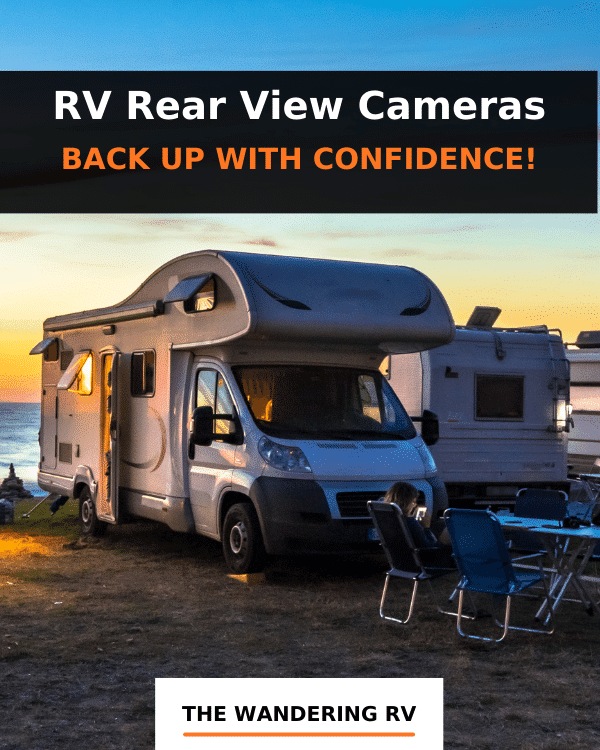
Looking for the best RV backup camera of 2023?
Whether you want budget or premium, we’ve found the best backup camera in each category!
In this post, we’ll be talking about whether or not you really need a backup camera, how to choose one, different types of RV backup cameras, and our top choices.
We also have a small FAQ section at the end! Let’s dive into this giant post!
Table of Contents
- Need Help Quick? Here Are Our Choices
- Do You Need an RV Backup Camera?
- How to Choose RV Backup Camera Systems
- Types of RV Backup Rear View Camera Systems
- Top Backup Cameras (Wired & Wireless)
- FAQ / Conclusion
Note: Some of the links in this article are affiliate links. This doesn’t cost you any more than normal. Read our disclaimer for more info.
Need Help Quick? Here Are Our Choices
We go over quite a bit in this post – if you already know that you want a backup camera but you don’t want to spend an arm and a leg getting one, our budget-friendly option is:
Best Budget-Friendly Rear View Camera
Wired RV Backup Camera System
- Night Vision 18 IR LED
- Easy Wired Installation
- International IP68 Standard Waterproof level
- 7” 1080P screen
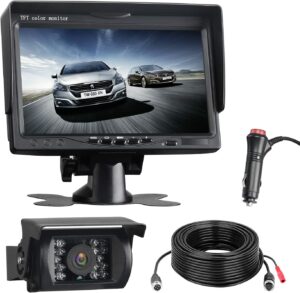
If you don’t mind paying more money for better quality, our choice for the best RV backup camera is:
Best Premium Rear View Camera
Wireless Dual Camera Rear View Kit
- 2 cameras for 2 video inputs
-
18 infrared LEDs, CMOS sensor, and digital HD image processor
-
100% waterproof
-
1080P video & a 7″ screen
-
320ft range
- DVR recording function
- Parking Assist Line
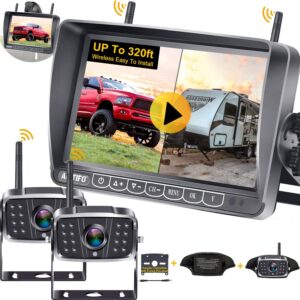
Do You Need an RV Backup Camera?
The honest answer is… no.
You don’t need a backup camera attached to your RV.
However, we highly recommend getting one for your safety.
You could have the cleanest driving record… and still get into an accident.
Backing your RV into a gas pump (…guilty) or nearly escaping a close encounter with the RV next to you while trying to maneuver yourself out of your site will be much less likely if you have a backup camera.
There’s a fair bit of research you have to do before you settle on a backup camera before you go out and purchase one, though.
Let me walk you through some of the steps!
How to Choose RV Backup Camera Systems
So, you’re in the market for a backup camera, only there’s a slight problem…
… you have no freaking idea what to look for when browsing/buying one!
Been there, done that! We wanted to help you with this as much as we could and came up with a few things you should keep in mind.
The first thing you want to think about is:
Video and Camera Quality
The video and camera quality of your RV backup camera system is extremely important to be able to see at night and with a wide field of view.
We recommend going with a camera and observation system (monitor) that has a digital video signal to avoid interference with other electronics.
You can also find a wireless rear view system that comes with a split screen monitor, infrared, night vision, colored, and black and white options! We’re not saying you need all that, but it is pretty cool and can be helpful in dark situations.
You may also want to look for a system with grid lines to show you how much you can turn and reverse without hitting someone, as well as side cameras to help you get a better viewing angle when switching lanes on the highway and making tight turns. A wide field of view shows you more and reduces blind spots.
Installation
Unless you plan on taking your brand new RV backup camera system to a professional to install it, you should purchase one that is easy to install.
Wireless RV backup cameras are the easiest of the two, but have their own faults (we’ll get to that later).
Price
Lastly, you have to determine how much money you’re willing to spend on a backup camera for your RV.
That said, you’re getting what you pay for. If you want something that’s incredibly high-tech that’ll last a few years and can afford to spend a few extra dollars, you may find that it’s worth it.
If you have a budget you’re trying to stay inside of, that’s okay too! Just note, some features might not be included in all models (such as infrared and night vision).
Pro Tip: Keep in mind that for some models, you also have to purchase a mounting bracket to properly install your backup camera.
Types of RV Backup Rear View Camera Systems
There are two types of RV backup cameras to be on the lookout for:
Wired and Wireless.
Let’s dive a little deeper into each type.
Wired RV Backup Cameras
A wired RV backup camera can be used on literally any RV – motor homes, fifth wheels, utility trailers, travel trailers, and more.
Because this backup camera is wired into your RV, you don’t have to worry about losing the signal as much as you would with wireless RV backup cameras (this is especially good if you have a longer RV, keeping the signal is harder the further away it is).
Wired RV backup cameras tend to cost a bit more than a wireless RV camera, however. Especially if you need to have it professionally installed.
Wireless RV Backup Cameras
Wireless RV backup cameras are the easiest to install.
They need to be plugged into the DC (12 volt) inside of your RV and boom – you’re good!
The monitor is plugged into the cigarette outlet in the console of your RV and comes with a mounting bracket or a suction cup to sit on top of the RV dash.
The main problem with wireless RV backup cameras is how unreliable they can be (depending on the size of your RV). Many complain about the signal not being strong enough.
Which Is Better?
This is one of those “can you deal with the negatives of one or are they a deal breaker” kinds of questions.
If it were me, I’d go with a wired RV backup camera mainly because I wouldn’t want any interference when driving.
If you have a smaller rig, this may not be an issue for you. As I said before, the signal will waver more if your rig is larger.
It’s really up to you!
Top Backup Cameras (Wired & Wireless)
Let’s quickly go over the top 3 wired and wireless backup cameras to get in 2021.
Note: These backup cameras are purely based on our opinions, there are tons on the market; we’re just sharing what we believe to be the very best!
Top 3 Wired Backup Cameras
Rear View Safety Backup Camera RVS-770613
- 18 infrared lights allow you to see up to 50 feet even in the darkest night
-
Completely waterproof
-
Color CCD backup camera with 130° viewing angle
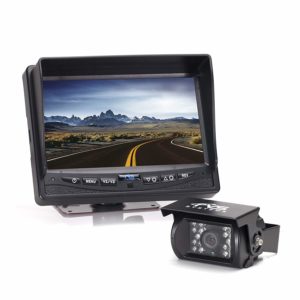
Wired RV Backup Camera System
- Night Vision 18 IR LED
- Easy Wired Installation
- International IP68 Standard Waterproof level
- 7” 1080P screen

Backup Camera System Kit ERY01-Wired
- 18 Infrared Lights
-
Auto dimming feature
-
50′ camera extension cords
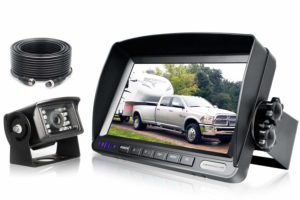
Top 3 Wireless Backup Cameras
Digital Wireless Backup Camera System
- 18 infrared lights and CMOS sensor
-
Voltage range from 12-24V DC power
-
IP69 waterproof standard
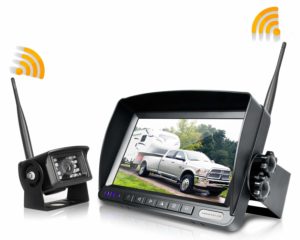
7″ 1080P Waterproof Wireless Rear View Camera
- Supports 4 wireless backup cameras
-
7″ 1080P LCD wireless reversing monitor
-
320′ of wireless distance
-
30-day money-back guarantee and 2-year warranty
- Adapter for Furrion Pre-Wired RVs
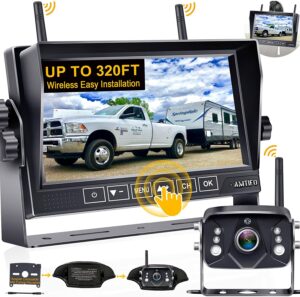
Wireless Dual Camera Rear View Kit
- 2 cameras for 2 video inputs
-
18 infrared LEDs, CMOS sensor, and digital HD image processor
-
100% waterproof
-
1080P video & a 7″ screen
-
320ft range
- DVR recording function
- Parking Assist Line

FAQ / Conclusion
We’ve covered a lot so far, but wanted to end this article with a few frequently asked questions.
How Do I Install My Motorhome Backup Camera?
Depending on whether you have a wired or wireless RV backup camera, there are different ways on how to do this.
We recommend checking out this post for more help (as we’re not experts on this, ourselves).
Should I Get A CCD or CMOS Sensor?
CCD sensors (charge coupled device) create high-quality images with low noise. They’re sensitive to light and are great to use in low-light settings.
CMOS sensors (complimentary metal oxide semiconductor) need far more light to create low noise images.
For better picture and video quality, I’d go with the CCD sensor. This way, you’ll get the best of the best even at night when there’s little to no light.
How Do I Fix My RV Backup Camera?
If you feel confident in your abilities and have a manual on how to fix the underlying issue with your RV backup camera, by all means, go fix it!
If it were me, though? I’d take it to a professional. Without proper knowledge on how to fix your RV backup camera, you may end up making matters worse.
As always, if we didn’t answer a question we have listed, don’t hesitate to ask us in the comment section below!
Until then, happy RVing!
Other RV Buying Guides:
- Must-Have RV Accessories, Supplies & Parts
- RV Refrigerators
- RV Air Conditioners
- RV Water Pumps
- RV Antennas
- RV Recliners
- RV Roof Coating & Sealants
- RV Leveling Blocks
- RV Batteries
- Best Portable Grills
- RV Water Filters
- RV Surge Protectors
- RV Generators
- RV Mattresses
- RV Backup Cameras
- Portable Toilets
- Portable Camp Sinks
- Camp Chairs with Canopy
- RV Covers
- RV WiFi Boosters
- RV Outdoor Rugs

